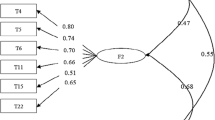Abstract
The effect of Internet use as a mediating variable on self-efficacy as it relates to the cognition of network-changing possibility (i.e., connecting people or groups with different social backgrounds) was examined. The results showed that Internet use (i.e., the frequency of sending e-mail, friends made on the Internet) had a positive effect on the cognition of network-changing possibility. The cognition that it is possible to connect people with different social backgrounds by using the Internet also had a positive effect on self-efficacy. On the other hand, the cognition that it is possible to find people or groups who share beliefs and interests by using the Internet negatively affected self-efficacy. Hence, it was found that the effect of Internet use on self-efficacy was different as a function of cognition of network-changing possibility.
Similar content being viewed by others
Notes
Informal groups were classified by three categories: “out of hours co-worker group”, “study/training group”, and “hobby circle”.
References
Bandura A (1977) Self-efficacy: toward a unifying theory of behavioral change. Psychol Rev 84:191–215
Bandura A (1997) Self-efficacy: the exercise of control. W. H. Freeman and Company, New York
Berelson BR, Lazarsfeld PF, McPhee WN (1954) Voting: a study of opinion formation in a Presidential election. University of Chicago Press, Chicago
Furutani K, Ura M (2005) The effect of mail on connecting heterogeneous people and collecting group: a view point of moderate effect of social network diversity. In: Proceedings of the 46th annual meeting of the Japanese society of social psychology (in Japanese). Kanseigakuin University, Japan, pp 102–103
Ikeda K, Shibanai Y (1997) The logic of social networking and constitution of group. In: Ikeda K (ed) Networking community. University of Tokyo Press, Japan pp 2–25 (in Japanese)
Kobayashi T, Ikeda K (2005a) Networking and dis-networking of mobile communication. In: Ikeda K (ed) Internet community and daily social world. Seishin Shobo, Japan, pp 67–84 (in Japanese)
Kobayashi T, Ikeda K (2005b) Social capital in online communities. In: Ikeda K (ed) Internet community and daily social world. Seishin Shobo, Japan, pp 148–184 (in Japanese)
Kobayashi T, Ikeda K, Miyata K (2006) Social capital online: collective use of the Internet and reciprocity as a lubricant of democracy. Inf Commun Soc 9:582–611
Ministry of Internal Affairs and Communications (2005) White Paper 2005, Gyosei, Japan (in Japanese)
Miyata K (2005) Social psychology of internet. Kazama syobo, Japan (in Japanese)
Miyata K, Wellman B, Boase J, Ikeda K (2005) The Mobile-izing Japanese: Connecting to the Internet by PC and Webphone. In: Yamanashi, Mizukoshi I, Okabe D, Matsuda M (eds) The personal, portable, pedestrian: mobile phones in Japanese life. MIT Press, Cambridge pp 143–164
Mutz DC (2002a) Cross-cutting social networks: testing democratic theory in practice. Am Polit Sci Rev 96:111–126
Mutz DC (2002b) The consequences of cross-cutting networks for political participation. Am J Polit Sci 46:838–855
Narita K, Shimonaka Y, Nakazato K, Kawai C, Sato S, Osada Y (1995) A Japanese version of the generalized self-efficacy scale: Scale utility from the life-span perspective (in Japanese). Jpn J Educat Psychol 43:306–314
Norris P (2003) Social capital and ICTs: widening or reinforcing social networks?. Presentation paper at the “International Forum on Social Capital for Economic Revival”. The Economic and Social Research Institute, Tokyo, 24–25th March 2003. Session 5 ‘Social capital and ICTs’
Portes A (1998) Social capital: its origins and applications in modern sociology. Annu Rev Sociol 24:1–24
Portes A, Landolt P (1996) The downside of social capital. Am Prospect 26:18–21 [online] http://www.esri.go.jp/en/workshop/030325/030325paper6-e.pdf
Putnam RD (2000) Bowling alone: the collapse and revival of American community. Simon and Schuster, New York
Quan-Haase A, Wellman B (2002) Capitalizing on the net. In: Wellman B, Haythornthwaite C (eds) The Internet in everyday life. Blackwell, Amsterdam, pp 291–324
Tsuji D, Mikami T (2001) A preliminary student survey on the e-mail uses by mobile phones. [online] http://homepage3.nifty.com/dt/paper/r02/rsm_0106.pdf (in Japanese)
Acknowledgments
We thank Hiroshi Hirano (Gakushuin University), Kakuko Miyata (Meijigakuin University), and Ken’ichi Ikeda (The University of Tokyo) for their collaboration in the design of this survey.
Author information
Authors and Affiliations
Corresponding author
Additional information
Research for this study was supported by grants from the Japan Society for the Promotion of Science, KAKANHI15330137.
Rights and permissions
About this article
Cite this article
Furutani, K., Kobayashi, T. & Ura, M. Effects of Internet use on self-efficacy: perceived network-changing possibility as a mediator. AI & Soc 23, 251–263 (2009). https://doi.org/10.1007/s00146-007-0132-3
Received:
Accepted:
Published:
Issue Date:
DOI: https://doi.org/10.1007/s00146-007-0132-3




